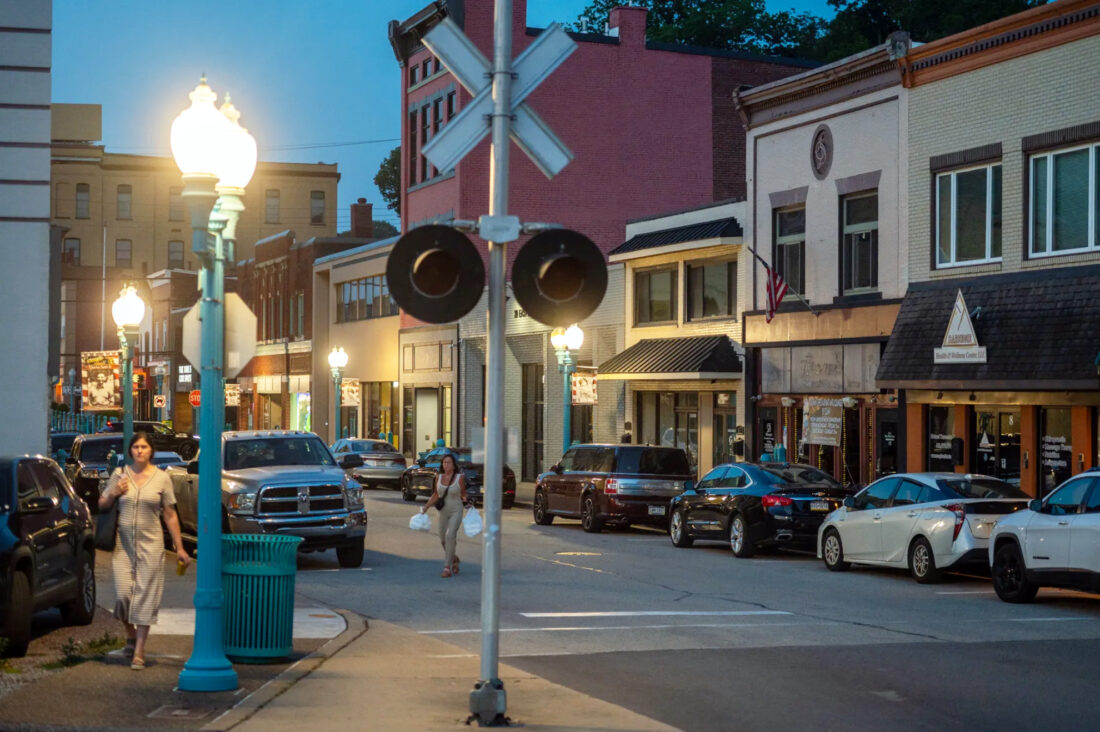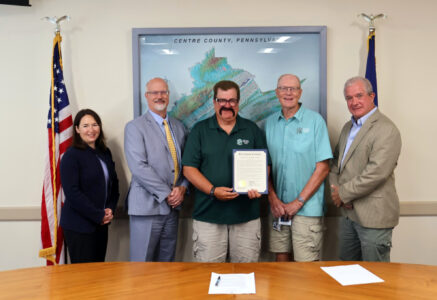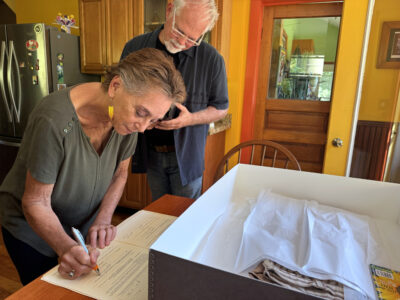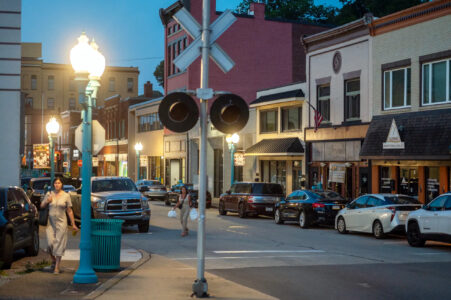County government and municipalities in Pa. look to ease economic hardship threatening Main Street

Photo by Stephanie Strasburg/Pittsburgh’s Public Source Streetlights line the business district of East Main Street in downtown Carnegie, Thursday, July 24.
Carnegie Borough’s recent history of flooding and fire disasters reads like an ancient religious passage in which a people’s faith is tested through acts of destruction.
If it is a test, the borough’s businesses and new leadership is doing its best to keep the faith by enlivening East Main Street’s commerce even as new economic challenges including tariffs and rising costs threaten the small businesses that populate the half dozen-block stretch.
Price increases can be dire for the small enterprises that make up the overwhelming majority of U.S. businesses. Shops on the Main Streets of western Pennsylvania that have been through deindustrialization, the opioid crisis, the Great Recession, the pandemic and sometimes natural disasters now face smaller profit margins and rampant economic uncertainty. Allegheny County government is taking note of these challenges, with County Executive Sara Innamorato investing $1.5 million to help small businesses and districts.
The challenge is clear in the towns along Chartiers Creek, which passes a number of communities that have attempted to build commerce and traffic through walkable town centers even as auto infrastructure dominates. Among them is Carnegie, a place the next mayor says is “caught in the middle” between well-off neighborhoods with enough resources to market themselves and distressed communities that qualify for more help.
“During the pandemic, we had more business move in than leave but since then we’ve been dealing with everything other Main Streets are dealing with: higher costs, people doing more online shopping.” said Sam Bigham, 23, the executive director of the Carnegie Community Development Corp.
“Carnegie has been going through a lot and I’m sure we can get back on track to the rebound we’ve been having,” said Bigham, the winner of the Democratic mayoral primary. “But we’re at a crossroads. If things don’t change soon, a fair number of businesses will go under and increase vacancy rate and that would in turn make it harder to keep Main Street vibrant.”
Disaster, recovery, repeat
Like most of the region, Carnegie’s early growth was tied to coal mining and steel production. It even took its name from the ultimate industrialist, Andrew Carnegie, after he funded its school and library.
Those industries famously faded, and challenges continued in the 21st century, with the area suffering major flood damage in 2004 from Hurricane Ivan that left mass vacancy still felt today in a part of the borough known as Irishtown.
“That’s the biggest residential neighborhood in a flood zone and that whole neighborhood was devastated by the flood,” Bigham said. “You’ll see empty lots where there used to be buildings.”
He said that the borough was on the rise between 2012 and 2018, gaining media and consumer attention over crowd-pleasing businesses like Papa J’s Ristorante and Riley’s Pour House.
Papa J’s burned down in 2018, in a fire that claimed one life and displaced about 25 building residents while putting 40-plus restaurant employees out of jobs. In 2021, the owners previewed plans to rebuild a space for the restaurant with 42 apartment units but they ultimately opted to move to Pittsburgh’s Strip District.
Riley’s Pour House, which opened in 1979, burned down in November. Efforts are underway to finance reconstruction, according to the pub’s Facebook page.
“Losing Papa J’s and then the Pour House also to a fire last November is putting a strain on a lot of our businesses,” Bigham said.
“That whole block on Main Street [that formerly included Papa J’s] is empty. The owner has not built on it and we’ve been stuck with it for seven years,” he said.
Bigham said he hopes to use his dual positions as mayor and development director to help bring businesses back to town.
“I think being a young person I can give people a fresh face and something for people to talk about: ‘They elected a young person. What’s going on there? We should visit,'” he said. “I think I can do a lot to market the town on social media and get positive attention on Carnegie.”
For now, East Main is anchored by Carnegie Coffee Company, a shop holding the line in a repurposed post office.
But Bigham said the area is at an inflection point, where commerce could increase or vacancies will increase.
Eccentricity Designs
answers tariffs with
‘chutzpah’
Along East Main, Bonita Farinelli runs an interior design company Eccentricity Designs, where she said she has witnessed a decline in foot traffic customers over the last five years.
After the pandemic-induced shutdown, Farinelli turned to bringing her business online but has struggled to maintain a web presence even as walk-ins have plunged.
“Ever since Riley’s burned down, foot traffic is down 70%,” Farinelli said. “Riley’s brought Carnegie to people’s attention.”
As a designer for commercial and residential spaces, Farinelli gets her fabric and materials from around the world and worries about what rising tariffs will do to the cost of her products.
“I’m desperately trying to stay afloat with the business,” she said. “You have to work so much harder to get that money than you did before. … You have to have chutzpah in life now.”
Studio’s clients face
Medicaid cuts
Laura Stuart is summoning all the chutzpah she has as she faces rising costs of art supplies and fewer funding opportunities for the nonprofit organization Studio Forget-Me-Not.
Studio Forget-Me-Not, on East Main, provides a variety of art classes for people 16 and older who have a disability or neurodivergence. Stuart, the director, said that the building’s utilities continue to go up.
Stuart worries that the federal government’s Medicaid cuts will jeopardize both her clients and the workshop’s financial security.
“We rely on grants and now there’s fewer grants available,” she said.
Mixing mead
and pinball
Bigham said the Carnegie Community Development Corporation supports businesses and helps reduce vacant spaces by attracting people to the area through events like bar crawls and farmers’ markets. But the organization’s efforts have become more limited with organizational funding drying up while Bigham serves as the only paid employee.
The bar crawl is a welcome feature for Apis Mead & Winery owner David Cerminara, who sees the event as a source of increased foot traffic. Crowds are a welcome sight to Cerminara as he is beginning to see prices on his key ingredients rise.
“Our fruit supply price has basically doubled. Prices aren’t going to come down. Nothing ever comes down once it goes up,” Cerminara said.
Cerminara said he gets his fruit and honey from local farms and apiaries, and those sources have raised their prices “dramatically.”
“That has exponentially risen and continues to rise,” he said. “Blackberries and strawberries have really gone up. Whole and pureed fruit has almost doubled.”
Federal data shows strawberries running around 47% higher this June than last, though not quite as high as in some prior years.
Most of his wine sits at $7.50 a glass with $9 being the most expensive option. “I can’t turn my $7 glass to a $14 glass. So I have to eat the loss.” He noted that “people don’t have a lot of money in their wallets.”
Cerminara began his business around 11 years ago in a building attached to Papa J’s that sustained damage to the roof and major flooding in the basement from first responders dousing the flames.
Cerminara moved the business to its current location on Mary Street, just off of East Main. “We ramped up for 2020 to be our best summer ever.” He weathered the pandemic through online orders, then began to update his business model to maintain customer interest.
“We have a band every month and have opened a kitchen since COVID,” Cerminara said. He’s added non-alcoholic drinks, more than 200 board games and 50 pinball machines. “We’ve pivoted to every direction you can think of.”
County efforts to aid small businesses
“Main Streets are so important in Allegheny County because they serve as the connective tissues, the spines — they are the life blood of the community,” said Allegheny County Economic Development Director Lauren Connelly.
“It’s a really significant part of our local economy and a significant employer,” she added. Across the county, there are about 18,000 businesses with fewer than 50 employees representing 150,000 jobs total, according to Connelly.
Connelly said that with tariffs on the rise and supply chain issues, she wanted to make sure the county is as business-friendly as possible.
“Many of our businesses rely on imports. Craft breweries are getting hit. Aluminum imports can impact the craft industry,” she said, as an example.
She noted that in Braddock the county has helped stabilize Main Street buildings using Community Development Block Grant programs and the county is conveying those to local entrepreneurs and small business owners to open and grow their businesses.
In Sharpsburg, she said the county is working with the community and making investments in infrastructure and riverside developments.
And in McKees Rocks, just down the creek from Carnegie, the county has invested in 13 affordable homes through the nonprofits LEVEL Equity Building and Action Housing, plus the county’s housing authority.
“We’re equipping municipalities with tools and resources they need to advance Main Streets,” Connelly said.
County Business Development Manager Elissa DiNello noted that a two-decade-old program, Allegheny Together, has allotted $6 million to 23 communities — including Carnegie — with downtown districts outside Pittsburgh. Those efforts are slated to expand under Innamorato with $1.5 million in new county funding next year. DiNello said more communities will be able to receive assistance with strategic planning, facade and streetscape improvements and pedestrian-friendly road upgrades.
So far, DiNello said, funding is secure for small businesses in need of technical assistance.
“We’re trying to really engage with the Main Street districts,” DiNello said.
County officials said they use every tool they can — social media, traditional media, printed materials, word-of-mouth, events and a 2,500-person email list — to spread the word on their programs.
Bigham mentioned state efforts like the Main Street Matters program but noted “they’re so competitive.”
He said Carnegie is neither “rich enough to sell what we do” nor “poor enough to access some of this government funding. We’re caught in the middle and that makes it more of a challenge than we want it to do.”
Carnegie has “funding for maintenance but if we want to do everything we envision, we need grants.”
Under President Joe Biden’s administration, Bigham said “there was a ton of funding made available and that money went into Carnegie and other municipalities. I’ve never seen so much construction as there was under Biden.”
With President Donald Trump “the worry now under Trump is cutting back on funding and the work we were doing. We won’t be able to do as much of it ’cause there will be less funding but the same amount of need for the funding.”
——
Eric Jankiewicz is the economic development reporter at Pittsburgh’s Public Source, and can be reached at ericj@publicsource.org or on Twitter @ericjankiewicz.
This story was fact-checked by Rich Lord and is republished here under a Creative Commons Attribution-NoDerivatives 4.0 International License.
——
Pennsylvania Capital-Star is part of States Newsroom, a network of news bureaus supported by grants and a coalition of donors as a 501c(3) public charity. Pennsylvania Capital-Star maintains editorial independence. Contact Editor Tim Lambert for questions: info@penncapital-star.com. Follow Pennsylvania Capital-Star on Facebook and Twitter.




